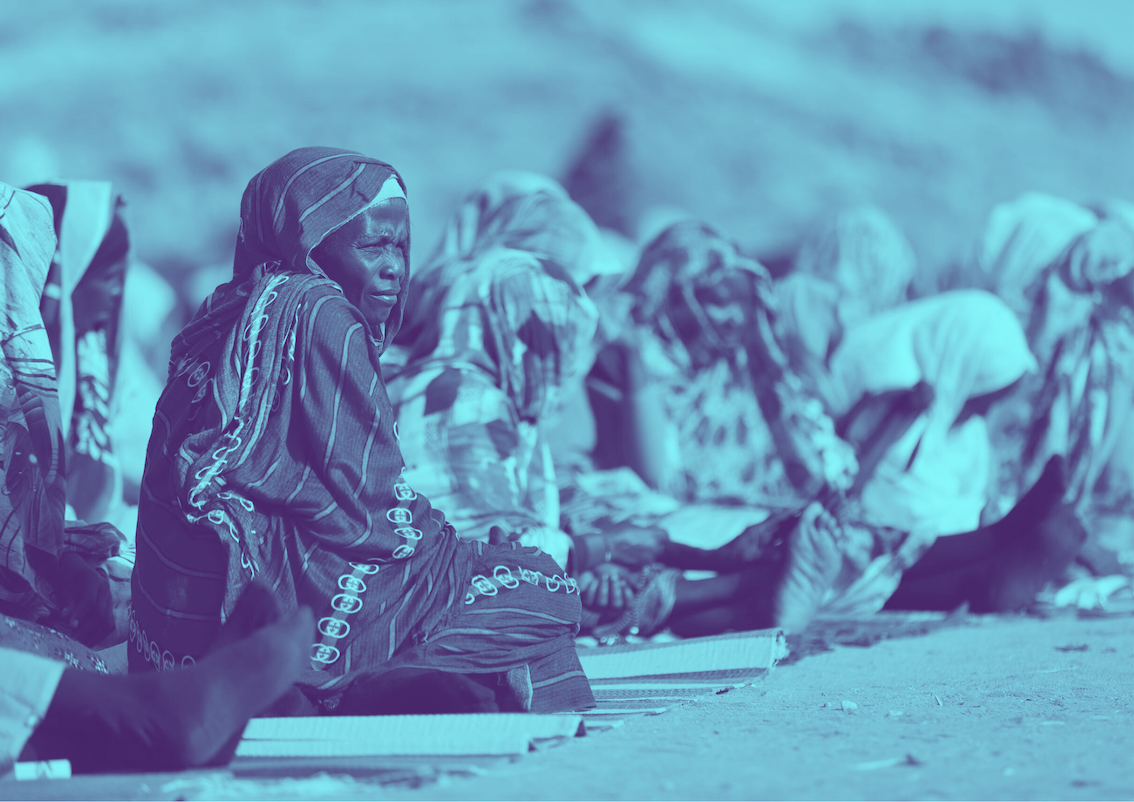Sudan Conflict Monitor #21

30 June 2025
The Sudan Conflict Monitor is a rapid response to the war in Sudan written through a peacebuilding, human rights, and justice lens, reflecting on the most important stories in the country. Please share it widely.
Powered by Ayin, Human Rights Hub, and the Sudan Transparency and Policy Tracker
In this issue:
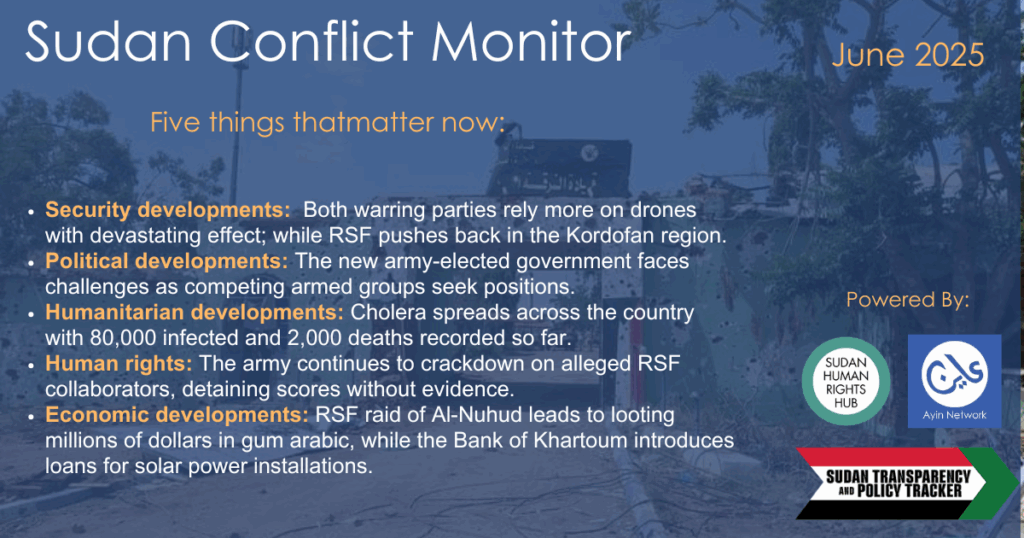
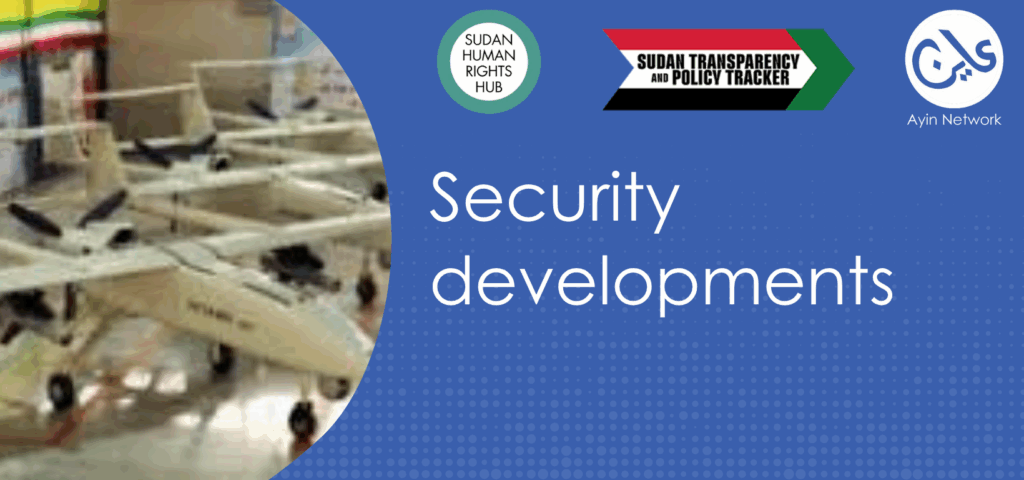
1. Security Developments
Drones are playing an increasingly prominent role in Sudan’s war
Sudan’s war has increasingly moved to the skies, with both the Sudanese Armed Forces (SAF) and the Rapid Support Forces (RSF) heavily deploying drones. While the SAF initially held air superiority, the RSF has significantly bolstered its aerial capabilities through the acquisition of advanced drones and air defense systems.
Early in the conflict (April 2023), the RSF primarily used rudimentary suicide drones for dropping explosives. However, by early 2025, they demonstrated significantly upgraded capacity, utilizing more sophisticated strategic drones for targeted attacks. They have also gained access to longer-range drones, enabling them to continue presenting a threat, even as they have been dislodged from much of the territory they formerly controlled. These drones are reportedly being operated from an RSF stronghold in Nyala, South Darfur.
In a particularly notable incident in early May 2025, RSF drones struck Port Sudan, the SAF-dominated government’s de facto capital. These strikes aimed to cripple SAF supply lines by destroying strategic oil reserves, power generation facilities and relay stations. The destruction of oil depots in Kosti also jeopardises future agricultural production.
The impact of the strikes was significant, exacerbating the humanitarian crisis, impeding the return of displaced persons, and worsening power outages.
Drones are also an indicator of foreign engagement in the war
The increasing reliance on drones highlights the belligerents’ dependence on foreign allies. The United Arab Emirates (UAE) is reported to be a regular supplier of drones and air defense systems to the RSF, while Turkey and Iran are providing advanced drones to the SAF. Additionally, the SAF has acquired Chinese and Indian-made drones. The RSF is also reported to have Chinese drones. This foreign involvement is transforming the conflict into an international quagmire.
Drone dependency on the RSF side may also be linked to decreased recruitment, RSF officers told Ayin on the condition of anonymity. Many of the RSF fighters formerly based in Khartoum, before the SAF retook the capital, have left the ranks to pursue trade, according to the same sources, which has prompted the RSF to conduct recruitment drives across Darfur and Kordofan states.
SAF responds with airstrikes
In response to the increasing RSF drone strikes, SAF has organised several attacks on Nyala, an RSF stronghold where the aligned “Tasis” group is expected to announce as the capital of its rival parallel administration. In early May 2025 SAF attacked Nyala airport, destroying an airplane and resulting in casualties, including foreign nationals and RSF soldiers. Among the casualties were reportedly several Emiratis. Days later, the RSF launched an apparent retaliatory drone attack on a SAF airbase near Port Sudan, reportedly targeting quarters used by Turkish and Iranian technical teams. The attack destroyed several Air Force jets on the ground, prompting the SAF to relocate its remaining war planes to airbases in neighbouring Eritrea. In mid-June, SAF carried out several drone strikes in Nyala which reportedly hit the airport and several other key facilities.
Pushed back from central Sudan, RSF fighting intensifies in the Kordofan region
After successful campaigns in late 2024 and early 2025 that saw the SAF expel the RSF from Jazeera, Sennar, and Khartoum states, ground fighting has intensified in western Sudan.
In late May 2025, the RSF recaptured a number of towns in West and South Kordofan previously held by the SAF, including Al-Debeibat and Al-Hamadi in South Kordofan, Al-Khuwei in West Kordofan, and Umm Sumaymah in North Kordofan.
Open terrain, extended SAF supply lines, and lack of air cover contributed to these setbacks, casting doubt on SAF plans to push through Kordofan and relieve pressure on its besieged forces in North Darfur. Some of the fiercest and deadliest battles between the belligerents took place around the besieged town of Babanusa in West Kordofan, where SAF forces repelled repeated RSF assault waves. Only Babanusa, home of SAF’s 22nd Division, and Heglig remain under army control in West Kordofan. Battles across the Kordofan region remain active, with strategic towns changing hands at high costs. Drone strikes reportedly played a key role in these advances and defensive postures and also were used for attacks in El Obeid.
On June 11, the RSF seized the strategic Sudan-Libyan-Egyptian border triangle area, a vital security, economic, and trafficking hub. The SAF surprisingly acknowledged the withdrawal of its forces, predominantly consisting of the Joint Forces of the Darfur armed movements in the face of reported aggression by RSF and Khalifa Haftar’s Libyan National Army (LNA). Haftar denied the allegation. This unprecedented LNA-assisted attack signals a direct challenge to Egypt, which supports the SAF, by Haftar and the UAE. The RSF further advanced into the western desert, capturing the Chevrolet army garrison, which undermines the SAF’s attempts to disrupt RSF supply routes from Libya and their plans to relieve El Fasher from Northern State.
The triangle area is rich in artisanal gold mining sites. Mines like Kouri Bougoudi and Mine 13 have become flashpoints for control among militias, traffickers, and state-linked actors. The RSF has historically dominated the gold trade through control of mining sites and smuggling routes via Libya and the UAE. However, Darfuri armed groups allied with the SAF are now contesting this control, intensifying resource-driven conflict to fund their war efforts. In addition to minerals, the area serves as a key route for irregular migration, which armed groups exploit through tolls and smuggling. These entrenched war economies give both the RSF and its rivals little incentive to restore state authority.
RSF capture of the Triangle area exposes fluid geopolitical landscapes
The RSF’s capture of the Triangle area exposes the complex and fluid geopolitical landscape of the conflict. While Egypt and the UAE were previously allied in supporting Haftar, they now back opposing sides in Sudan. Haftar’s reported direct involvement with the RSF demonstrates a notable shift in allegiances and poses a challenge to Egypt’s regional influence, though Egypt’s response remains cautious, likely due to its economic ties with the UAE.
Before the war began in April 2023, the RSF openly displayed hostility towards Egyptians. However, in his most recent speech, RSF leader Hemedti used a careful and diplomatic tone towards Egypt for the first time, suggesting that any disagreements could be resolved through negotiations. This shift in stance is likely an effort to maintain complex geopolitical relationships with Egypt, the UAE, and Libya, and to reassure Egypt that the RSF presence at their borders poses no threat.
The regional scene has only become more complex as the government of Sudan accused Kenya of supporting the RSF, accusing it of both acting as a conduit for weapons from the UAE as well as providing weapons directly. Kenya denied the allegations.
Against this backdrop, peace seems ever more elusive. No peace initiative of any kind has proceeded for almost a year, and a Saudi statement that it would revive the Jeddah process in late May does not appear to have gained any traction.
Potential El Fasher ceasefire
In a surprise move, army leader Burhan agreed to a one week ceasefire in El-Fasher following a call from UN Secretary-General António Guterres in late June. The RSF claim they have not received any communications on this agreement and, according to their legal advisor, Mohamed Al-Mukhtar, they will not accept a truce. El-Fasher, the capital of North Darfur State, and the surrounding regions faced a near year-long siege, deepening the humanitarian tragedy for an estimated 1.5 million people.
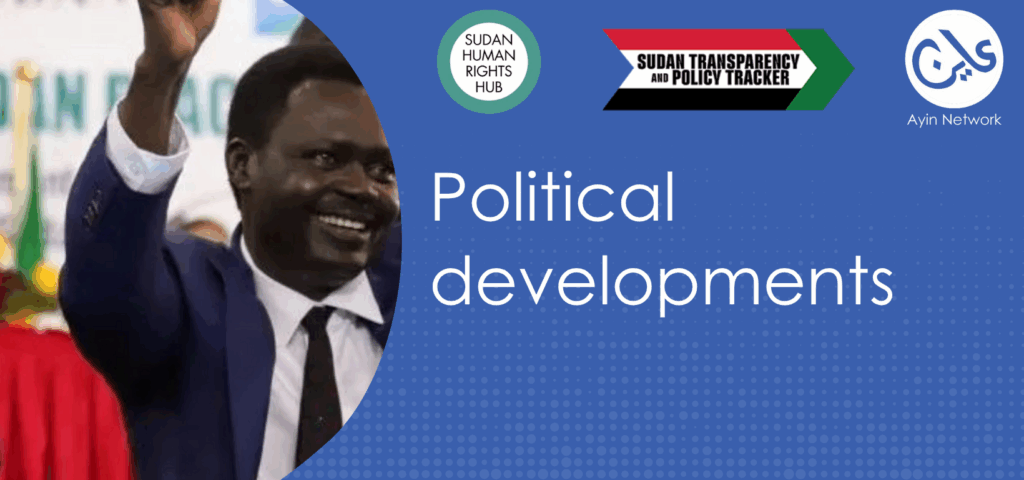
2. Political developments
The new government faces significant challenges
Dr. Kamil Idris was appointed Prime Minister on May 19, 2025 by Burhan and the SAF-dominated Sovereignty Council. He faces huge challenges, in establishing a functional administration.
First, his nomination has been called an illegitimate and divisive. It does not meet demands of the Sudanese population and international standards for a civilian-led, transitional administration as he was not appointed through an inclusive, negotiated, and transparent process. Since the 2021 military coup, Sudan has lacked a functioning constitution or a legal framework for executive nominations; the 2019 Constitutional Declaration, established during the transitional era, was effectively rendered void following the military takeover.
However, to provide a veneer of legitimacy for the coup government, the military retained the defunct Constitutional Document, amending it drastically to grant itself sweeping powers, including, inter alia, the authority to appoint and dismiss the prime minister, cabinet members, the chief justice, Supreme Court justices, and the Auditor General. The lack of parliamentary oversight or judicial review further undermines the legitimacy of such appointments. The amended document establishes a 39-month transitional period, starting from its promulgation in mid-February 2025.
Second, Idris dissolved the previous caretaker cabinet on June 1 and announced he he intends to appoint a cabinet of 22 “nonpartisan and technocratic professionals,” thus rejecting existing power-sharing arrangements. He has publicly asked for résumés for ministerial and senior civil service positions although the cabinet he dissolved had little track record of merit-based appointments.
Key figures in the previous cabinet, such as Finance Minister Gibril Ibrahim and Darfur Governor Minni Minawi –leaders of armed movements, Justice and Equality Movement (JEM) and the Sudan Liberation Movement (SLM), respectively — were awarded their positions under the 2020 Juba Peace Agreement (JPA). They, alongside the SPLM-N faction led by the Sovereignty Council’s Deputy Chairman, Malik Agar, threatened to withdraw from their alliance with the SAF if they are removed from their positions. Their withdrawal would weaken SAF, given the critical role the armed movements are playing in the current war effort.
Following a mediation, the armed movements remain in control of the three ministries – Finance, Mining, and Social Development — that command the majority of the state’s revenue from taxes, Zakat, customs, mining royalties, social security, retirement, and real estate investments. While Idris was addressing these hurdles, the Sovereignty Council moved ahead with appointing and swearing in the Ministers of Defense and Interior.
Further complicating the task of forming the competent and professional cabinet are competing demands by various SAF allies vying for a role in any future transitional government, whether in cabinet ministries, security institutions, or regional administrations. These actors include tribal militias, Islamist political and military factions (including remnants of the Bashir-era National Congress Party), political allies, and former rebel groups.
The remnants of the NCP are fighting to resurrect their three-decade Islamist rule, and see the ongoing conflict as an opportunity to reassert ideological dominance over state institutions and promote governance rooted in Islamist principles.
Tribal militias, on the other hand, are pushing for greater political representation and a fair share of the resources produced in their regions. Many demand local administrative power or influence over regional portfolios.
The Democratic Block and other political actors allied with the SAF, many of whom supported the October 2021 coup, continue to back the military’s claim to legitimacy and its proclaimed intention of controlling the post-war dispensation. These groups have publicly demanded inclusion in negotiations over the new cabinet appointments and transitional governance structures.
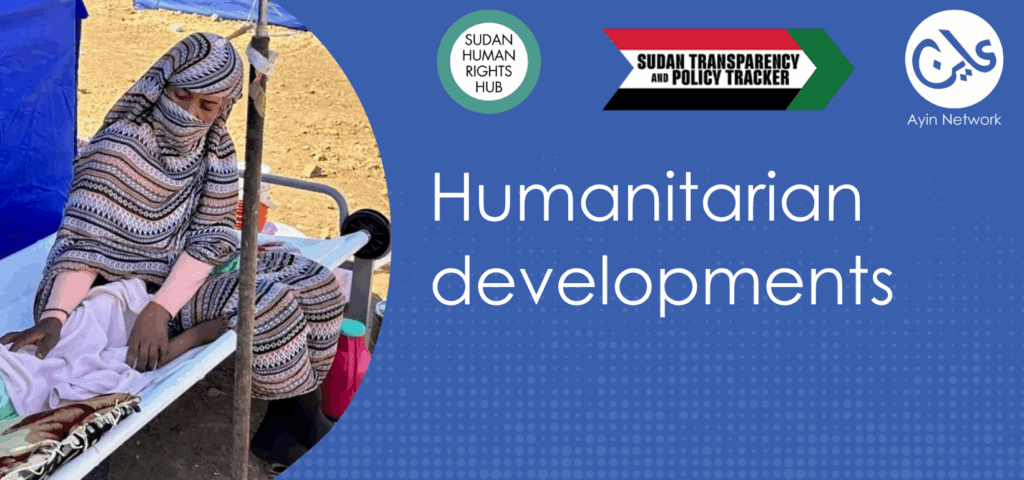
3. Humanitarian developments
Cholera burns through Sudan while the de facto government minimises the crisis
A cholera outbreak is raging in Sudan. It has infected more than 80,000 and killed more than 2,000 to date. Although it is most prevalent in Khartoum and Omdurman, it has also affected Darfur, Kordofan, Al Jazeera, and White Nile states. In Sennar, 153 cases had been recorded by June 9. The disease has imposed a significant strain on already overburdened health institutions, while officials of the de facto government persist in denying the magnitude of the issue, declining to declare a humanitarian emergency in accordance with United Nations guidelines.
Local clinics and field hospitals in Omdurman, Sudan’s second-largest city, have been inundated with people afflicted by acute watery diarrhea, a primary symptom of cholera. A medical worker at an emergency clinic in Ombada stated, “The cases are increasing daily, and we lack fluid supplies and antibiotics… We are attending to individuals on the floor with limited resources.”
Cholera, an infectious disease resulting from contaminated water or food, proliferates swiftly where sanitation infrastructure has deteriorated. Following over two years of civil conflict, the majority of Sudan’s urban areas, particularly Khartoum, have been deprived of access to clean water, adequate sewage management, and operational healthcare facilities. A vaccination campaign has been undertaken in response, but the vaccine is only effective short term so the efficacy of the strategy depends on how quickly the vaccine can be deployed.
Despite the escalating caseload and increasing mortality rate, Sudanese health authorities have declined to declare a national public health emergency, a classification that would typically activate supplementary international aid. Per UN guidelines, a nation attains humanitarian crisis status when an outbreak fulfills requirements including extensive transmission, overwhelmed local response capabilities, and insufficient access to potable water and sanitation conditions prevalent in Sudan currently. Sudanese officials contend that the outbreak is confined and is being managed by state institutions.
The war severely damaged the country’s already sub-standard medical infrastructure and this has weakened response to the crisis, increasing mortality. The current crisis also highlights the vulnerability of the country to other health threats, especially as many are being encouraged to devastated infrastructure in Khartoum.
New HAC registration requirements may further obstruct humanitarian response
The HAC laid out new registration requirements in late May, saying that no one could carry out humanitarian activities without registration. These moves have raised concerns that implementation may further undermine humanitarian response.
The new registration process requires payment of $800, a sum that could be quite difficult for small initiatives to afford and at a minimum draws vital resources away from services to administration. It will also require submission of a list of employees. Volunteers working for the independent Emergency Response Rooms, (ERRs), are concerned that this represents an attempt to disrupt their work, as most are not registered.
Challenges to humanitarian responses in Darfur
Approximately 300,000 have been driven to Tawila from fighting in El Fasher. Tawila is seen as relatively safe because it is controlled by the SLM-Abdelwahid Nur faction, who has remained neutral in the conflict. However, little aid is getting through because of various obstacles.
The warring parties’ deliberate attacks and restrictions on humanitarian access continue to undermine relief efforts, despite their stated commitments to humanitarian principles, such as in the Jeddah Declaration they jointly signed on May 11, 2023. In late May, the RSF repeatedly shelled World Food Programme (WFP) warehouses in El Fasher.
On June 2, a drone strike targeted a humanitarian convoy of fifteen trucks in the RSF-controlled town of Korma, North Darfur. The convoy—dispatched by UN agencies with clearance from Port Sudan but without final approval from the RSF—was heading to the besieged city of El Fasher. The attack killed five aid workers and destroyed five trucks, cutting off a vital aid lifeline to the city’s civilian population. The UN Security Council strongly condemned the attack and called for an immediate investigation. Both sides denied responsibility.
In mid-June, the Joint Forces—comprising Darfur armed movements now allied with the SAF—blocked a convoy of some 131 trucks carrying nutritional and medical supplies in the Northern State town of Dabba. The aid was destined for RSF-controlled Nyala, but the blockade appeared aimed at pressuring the military leadership to concede to the Joint Forces’ demands of retaining ministerial posts in the anticipated new cabinet. This obstruction occurred despite the convoy being dispatched by UN agencies—including UNICEF, WFP, and UNHCR—in response to the region’s acute humanitarian crisis.
The authorities eventually expedited approvals for both convoys blocked by the RSF and the Joint Forces, suggesting some improvement in the Port Sudan government’s handling of humanitarian access. The RSF reportedly reciprocated by approving the convoy to proceed to Nyala. . The military accepted a UN proposal for a one-week humanitarian pause to allow the delivery of assistance to El-Fasher. The RSF denied being approached and stated it would not accept the proposal, contradicting the UN Secretary-General’s assertion that both parties had been contacted.
In addition, funding cuts are drying up aid still further. Residents of Neem camp in East Darfur report that they had previously depended on food aid from WFP, but they have received nothing in the last four months. They also reported that the decision to close USAID has left medical centers working completely without supplies. 16 elementary schools were closed.
Fears of famine in the Nuba Mountains
Famine has already been declared in the western part of the region, which straddles South and West Kordofan states, while the central region is considered at risk. Humanitarians in the region reflect that conditions last year were the worst that they have seen in a region of want, but are concerned that this year will be worse. The recent alignment of the faction of the Sudan People’s Liberation Army – North (SPLM-N) led by Abdelaziz el-Hilu , which controls the region, with the RSF will increase incentive for the SAF to obstruct aid to the region. In addition, cuts in US assistance are already having a negative impact. Already doctors in the region say that there has been an increase in malnutrition cases in the region over the past few months. Conditions are expected to worsen further in the coming months as the traditional lean season takes hold.
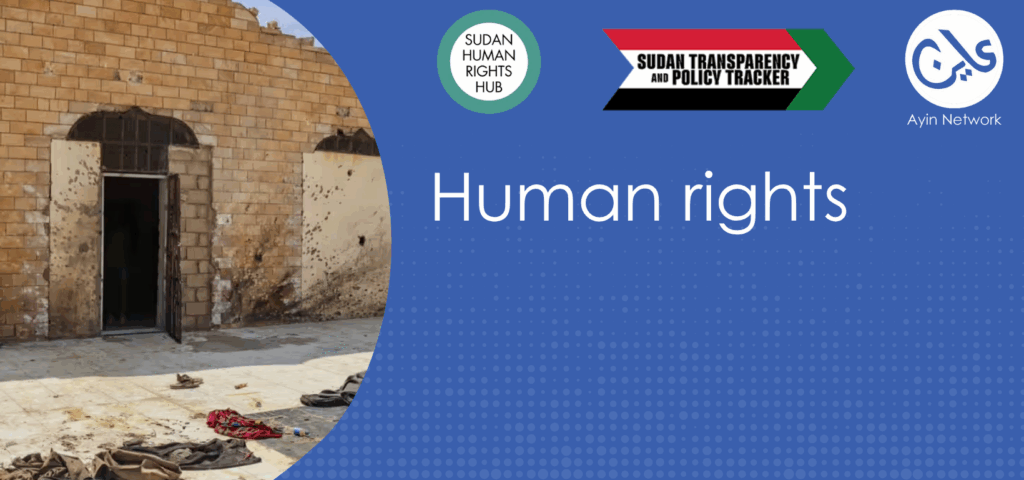 4. Human rights
4. Human rights
Sudanese Armed Forces intensify operations in Khartoum
Following its reassertion of control of Khartoum and Gezira states, SAF has initiated an extensive crackdown on neighborhoods identified as presenting a “security threat“ by demolishing homes of people alleged to be affiliated to RSF, especially in areas on the outskirts of Khartoum and in regions formerly under RSF control such as Al Khairat village in East Nile, where residents reported extensive demolitions of residences. The residents of Al Khairat village are primarily from Darfur and Kordofan and as many as 1,000 homes were reportedly destroyed.
Inhabitants of eastern and Northern Khartoum have reported extensive demolitions of residences and entire communities, especially in regions formerly deemed contested or under the sway of the RSF. These include Al Khairat village in East Nile, Khartoum state. The residents of the village were primarily from Darfur and Kordofan and as many as 1,000 homes were reportedly destroyed.
Numerous settlements, particularly those close to the outskirts of Khartoum North and along the eastern bank of the Blue Nile, have been destroyed in recent weeks by military bulldozers. Inhabitants received minimal warning prior to being compelled to evacuate their residences, leaving them little time to remove belongings or otherwise prepare to move.
In mid-May, a resident in Alkhayrat, appeared on social media in an official SAF uniform. They stated they had been accused of supporting the RSF, despite having fought for SAF, upon learning their home had been demolished and their area branded as pro-RSF.
SAF officials have publicly asserted that these districts were sheltering “criminal elements” and functioning as logistical centers for RSF fighters and that these operations are part of a comprehensive counterinsurgency plan aimed at eliminating residual RSF cells. The SAF claims that local residents are sheltering criminal elements and colluding with the RSF. They build on pre-existing prejudices against some of these communities, which have been targeted previously. These demolitions and displacements have however targeted large groups without any clear ties to the RSF. Human rights activists say the arbitrary character of SAF operations, and demolition of civilian residences without due process could constitute collective punishment, a breach of international humanitarian law.
They have also made those displaced more vulnerable with inadequate access to shelter, sustenance, and access to fundamental healthcare services, as well as persistent insecurity. Aid organisations indicate that tens of thousands have been displaced in the previous month, from the demolitions and insecurity, primarily seeking refuge in rural regions or already congested camps in White Nile and Blue Nile states.
Torture and executions increasingly documented on social media
Affiliates of both the SAF and the RSF have continued to share on social media alarming open-source material illustrating torture, extrajudicial killings, and mutilations. These include arrests, interrogations, torture, and executions. These recordings, frequently disseminated within hours of events, seem intended to scare adversaries and manipulate public narratives; yet, they also function as a troubling archive of potential war crimes in real time. Yet to date they have not elicited even any official condemnations or calls for accountability.
Proposed new media law increases concern over the free press
The de facto government has initiated discussion of a revision of the 2009 Press and Publications Act. The discussions have raised concerns about the potential impact of the new proposals, while also prompting some, like Malik Agar of the Sudan People’s Liberation Army – North to call for increased press freedoms. The proposed new media law would grant the military authority over online press outlets and increase military control.
Sudan Media Forum condemned the proposed revisions, arguing that “many of the recommendations pose a significant threat to press and media freedom in Sudan.” They tend to restrict freedoms and could violate Sudan’s international human rights commitments. A free media is critical for an open society and particularly for the rebuilding of a society scarred from war. The media needs, not more restriction, but facilitation and protection.
In particular the Media Forum criticised the overuse of ambiguous terms such as “national security requirements,” and “protection of societal values,” which could be used to arbitrarily suppress stories in line with government priorities. Moreover, there are vague provisions related to allowing the government to undertake monitoring “to ensure content quality.” Similarly to other concerns about vagueness, it is easy to imagine how such a provision might be manipulated by the government to suppress media with which it does not agree.
The Sudan Media Forum also raised concerns about the proposal to create an oversight body which would include security and military actors, which increases the risks of exploitation.
A new “report a collaborator” program is a recipe for disaster
On both sides of the conflict, human rights violations typically relate to civilians who are accused of allegiance to the other side. Both warring parties have threatened those opposing them. The RSF has said that civilians cooperating with SAF will be “punished.” SAF has deported foreigners accused of siding with the RSF.
Last month, the de facto government in Port Sudan launched a “Report a Collaborator” campaign that seems likely to exacerbate the situation. The campaign aims to create a platform for denouncing alleged RSF collaborators, and allows for individuals to be identified on the basis of suspicion, ethnic or geographic affiliations, rather than any concrete evidence of collusion. The Emergency Lawyers documentation group argues that such accusations undermine individual safety and the rule of law and creates a general climate of intimidation and chaos.
UN Fact-Finding Mission reports on continuing violations in Sudan
The UN Fact Finding Mission reported to the Human Rights Council on June 17, noting that “the conflict is far from over.” Their report highlights the use by both sides of heavy weaponry in populated areas, including a SAF bombing in Al Kuma that killed 15 civilians. The team also reported on the weaponisation of humanitarian relief, noting that the SAF has imposed bureaucratic restrictions while the RSF has looted convoys and blocked access entirely. The mission also noted an increase in sexual and gender based violence. The mission called for accountability and respect for the existing UN Security Council arms embargo on Darfur.
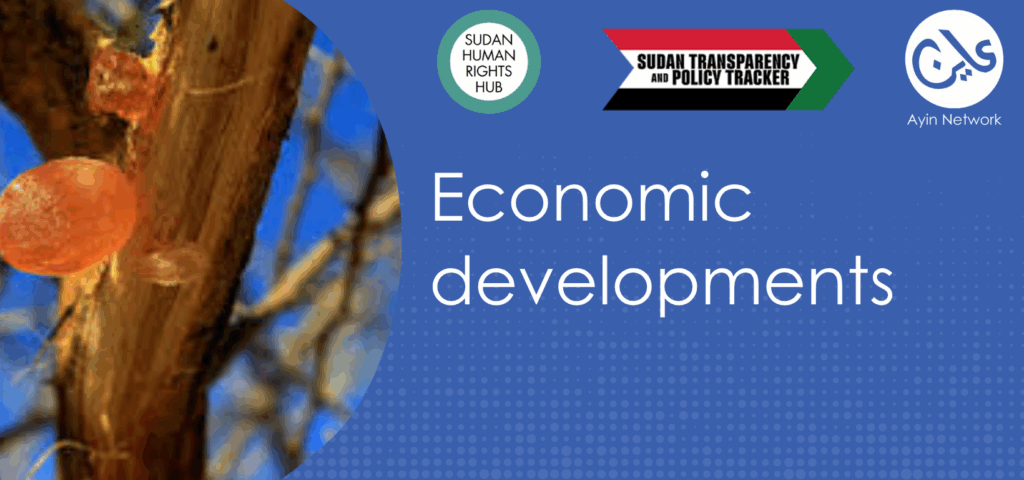
5. Economic developments
US sanctions hit the Sudanese economy
As reported in the last issue of the Sudan Conflict Monitor, the US imposed a new round of sanctions related to the use of chemical weapons. These measures include cutting
off loans, grants, and credit, freezing assets, restricting exports, and prohibiting US-backed financing. This immediately led to a sharp depreciation of the Sudanese pound, with the US dollar now trading between 2,600 and 3,000 Sudanese pounds.
The sanctions are expected to further isolate Sudan from the global financial system, making it difficult for banks to process international transfers or open letters of credit, and barring US companies from exporting advanced technologies. Despite the issuance of sanctions, the State Department has not made any evidence of the use of these weapons public.
Government presents staggering estimate of post-war reconstruction costs
STPT recently saw an internal report by the High Committee for Economic Strategy and Planning, dated August 2024, that estimated the cost of post-war infrastructure repair at least $771 billion – which some said at the time was inflated. However, with the destruction of the war ongoing and little sign of peace on the horizon, this figure, if accurate has undoubtedly increased. Pledges for reconstruction from regional powers like Saudi Arabia, Egypt, and Turkey are viewed with skepticism by some, who suggest these efforts may be driven by these regional powers’ desire to gain further influence and access to Sudan’s resources.
A new source of revenue for RSF
When the RSF took Al Nuhud, the country’s second largest hub for trade in gum arabic, in May, they were reportedly able to loot looted stores of the product worth tens of millions of dollars. Local businessmen estimated the value of the looted goods at $75 million, contributing to the looting by the RSF of other crops amounting to an estimated one-third of all cultivation this year.
Conflict in Sudan spurs deployment of solar power
With so much of Sudan’s infrastructure, including the power grid, destroyed by war, a new interest has been sparked in the development of solar power. The Bank of Khartoum has announced a program worth ten million Sudanese pounds to finance solar energy projects. This is intended, the bank says, to respond to the needs of citizens for alternative energy in the context of the quasi-total destruction of the power grid. In the Al Gereif neighbourhood of Khartoum, ERR volunteers have managed to restore lights in 70% of the neighbourhood through the installation of solar panels. Other ERR programming has reportedly restored power to 40,000 people in Bahri. An energy researcher interviewed by Ayin reported that the efforts of the ERRs dwarf those of the government.



